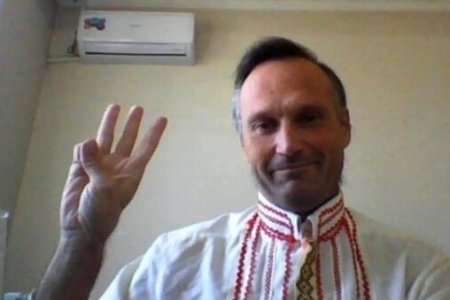
Russian-controlled ‘Crimean’ ‘courts’ are convicting Ukrainians on an almost daily basis of supposedly ‘discrediting the Russian armed forces’. The prosecutions are often brought over a Ukrainian flag or patriotic song, or for pro-Ukrainian comments on social media, and their number has increased significantly over recent months.
These are findings from the latest report by Crimean Process, a human rights initiative monitoring political persecution in occupied Crimea. The research covers only administrative prosecutions under the most common of the administrative and criminal charges rushed into law within days of Russia’s full-scale invasion of Crimea. Article 20.3.3 of Russia’s Code of administrative offences punishes for utterances or actions which purportedly ‘discredit the Russian armed forces’, with the scope of what actually prompts prosecution dangerously broad.
Over the 15 months since the beginning of the full-scale invasion and the introduction of the new administrative charge on 4 March 2022, it has been applied 350 times in occupied Crimea. Most, if not all, such cases involve merely the expression either of anti-war sentiments or of a pro-Ukrainian position, most often on social media. Moreover, the pace of such prosecutions has substantially increased over the last three months (from 65 in winter to 103 over the Spring months). 87 of the later have already come before an occupation ‘court’ with 85 Crimeans convicted of the charge; one acquitted and the last returned to the ‘prosecutor’ to be worked on.
The authors of the report note that occupation ‘courts’ hide a substantial percentage of such rulings, with only 40% of the prosecutions on open access. There is also enormous delay in informing of the place and time of a ‘court hearing’, with such information often made public as much as two weeks after it took place.
During the nine years of Russian occupation of Crimea, certain ‘judges’ have become notorious for their involvement in politically motivated prosecutions. With respect to the above administrative charges, Crimean Process noted that 70% of the ‘judges’ are either individuals who are wanted in Ukraine for treason, or are Russians brought into occupied Crimea. Russia as a whole, and all such individuals, are violating international law which expressly prohibits the application of Russian legislation and practice on occupied Ukrainian territory.
The authors found that not one of these occupation ‘courts’ had disputed the applicability of Article 20.3.3 despite the most bizarre claims. It was asserted, for example, that the caption ‘a peaceful sky over our heads’ discredited Russia’s armed forces and warranted ‘administrative punishment’. Essentially any pro-Ukrainian sentiment, including ‘Glory to Ukraine!’, could result in a person facing administrative charges (which carry either a fine or up to 15 days’ imprisonment). There were convictions over demonstration of a tattoo with the map of Ukraine; of an embroidered blouse and manicure in the colours of the Ukrainian flag. There were at least four convictions for supposedly ‘discrediting the Russian armed forces’ either through posting the Ukrainian flag or through a video playing Ukraine’s national anthem. As reported, a 20-year-old from Bakhchysarai (probably Evelina Memetova) received a 50 thousand rouble fine on 10 March merely for having posted the national anthem on social media. The ruling (from ‘judge’ Vasily Koshelev from the occupation ‘Bakhchysarai district court’) made no attempt to explain the surreal claim (essentially just a verbatim quoting of Article 20.3.3) that, by posting Ukraine’s national anthem, the young woman had “carried out public actions aimed at discrediting the use of the armed forces of the Russian Federation for the purpose of defending the interests of the Russian Federation and its citizens, of defending international peace and security within the framework of the demilitarization and denazification of Ukraine. In this way, she committed the administrative offence envisaged by Article 20.3.3 § 1 of the RF code of administrative offences”.
Of the 350 cases, several have also been for Ukrainian patriotic songs, either played at weddings, etc., or sung with the recording posted on social media. Several members of the families involved in a Crimean Tatar wedding received up to 15 days’ imprisonment or hefty fines for playing ‘Red Kalyna’ [‘Ой у лузі червона калина’ [‘In the meadow there is a red kalyna, or red vibernum’]. This song has, in fact, resulted in several ‘convictions, including of 34-year-old Crimean beauty queen and a friend who sang the song from their balcony. She received a fine, while her friend was jailed, with Article 20.3.3. The occupation regime has also claimed that playing or singing the song constitutes ‘propaganda or public demonstration of symbols or other elements of extremist organizations or other symbols, etc. that are banned.’ The excuse for such a charge is the claim that slogans from the song were used by the Organization of Ukrainian Nationalists, which Russia has banned. In fact, the reason for such hysteria about a song (which apparently had been played at Crimean Tatar weddings throughout Russia’s occupation) is doubtless due to the prominence it has gained since Russia’s full-scale invasion of Ukraine. The version first sung alone by Andriy Klyvniuk from Boombox, then accompanied by others in a powerful Zoom performance became known worldwide through a Pink Floyd version with all proceeds going to the Ukrainian Humanitarian Fund.
On 20 March 2023, a person was convicted of ‘discrediting the Russian armed forces’ for the phrase ‘Crimea is Ukraine’. The charges are manifestly absurd, but not the worst that a person could face for expressing this internationally accepted position. Shortly after Russia’s invasion and annexation of Crimea, a new criminal charge was introduced which punished for something called ‘making public calls to action aimed at violating Russia’s territorial integrity’, with it widely feared that Russia would use this to imprison (for up to five years) people who publicly spoke of Crimea being Ukrainian and of Russia’s illegal occupation. Several people, both in occupied Crimea and Russia have already received real or suspended sentences, including in the case of Suleiman Kadyrov for the comment on Facebook that Crimea is Ukraine.


